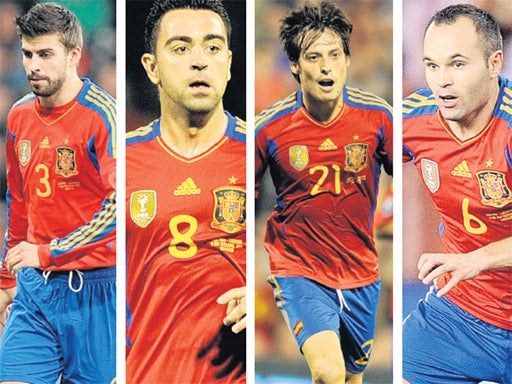Spain: marathon men
Spain have every right to be exhausted after four taxing years of almost non-stop action but the chance to claim a unique treble is spurring them on. By Pete Jenson

Your support helps us to tell the story
From reproductive rights to climate change to Big Tech, The Independent is on the ground when the story is developing. Whether it's investigating the financials of Elon Musk's pro-Trump PAC or producing our latest documentary, 'The A Word', which shines a light on the American women fighting for reproductive rights, we know how important it is to parse out the facts from the messaging.
At such a critical moment in US history, we need reporters on the ground. Your donation allows us to keep sending journalists to speak to both sides of the story.
The Independent is trusted by Americans across the entire political spectrum. And unlike many other quality news outlets, we choose not to lock Americans out of our reporting and analysis with paywalls. We believe quality journalism should be available to everyone, paid for by those who can afford it.
Your support makes all the difference.When history beckons even the tired come running: this summer, Spain can become the first team to win three back-to-back tournaments and although fatigue and the absence of arguably their two most important players count against them, the benefits of picking a team from the two best club sides in the world and the incentive of being the first to do the "impossible treble" mean they remain the team to beat.
The marathon journey for these players began at Euro 2008, which they won. The following summer they reached the semi-finals of the Confederations Cup in South Africa with a full-strength squad and then in 2010 they went all the way in the World Cup. That left 2011 as a summer off but the Barcelona players hardly rested as pre-season was replaced by an arduous tour of the United States.
But it was being found out as opposed to burnout that was on the players' minds yesterday. Ahead of tonight's penultimate friendly against South Korea (they play Jose Camacho's China on Sunday before landing in Gdansk on 5 June) Xabi Alonso spoke of it being "more difficult to retain the title this time than it was to win it the first time". Iker Casillas added: "In 2008 when we won we were the surprise package. Now teams know how we play."
The preoccupation is as much over-exposure as exhaustion – a fear that teams have caught on to the way they play and so now know the best way to stop them. Not that knowing how Spain would play enabled anyone to stop them in 2010.
The German coach, Joachim Löw, whose team are best placed to take advantage of any slip, is certainly not buying the exhaustion theory. "We heard the same ahead of the South Africa World Cup," he said.
And he still has Spain as favourites: "Not just because they won the last European Championship and the World Cup, but because the squad is essentially made up of two club sides – Real Madrid and Barcelona."
Madrid will supply four of Vicente del Bosque's starters on 10 June against Italy. Four Barcelona players will join them, along with the Valencia left-back Jordi Alba, Manchester City's David Silva and whichever striker gets the nod from Seville's Alvaro Negredo, Chelsea's Fernando Torres and Athletic Bilbao's Fernando Llorente.
Over half of Del Bosque's squad come from Real Madrid or Barcelona and the fact that there was no clasico Champions League final gave those players a physical and emotional break – one that the statistics for games played this season (see team graphic) show they needed.
Those for whom the burden of games has been heaviest – Alonso, Sergio Ramos and Xavi – have the greatest motivation. As important players in 2008 and 2010 they will lay greatest claim to the "record-breakers" tag should Spain do what the West German side of 1976 came within a shoot-out of achieving, and win two European Championships either side of a World Cup.
Carles Puyol and David Villa would have shared the acclaim. They will be sorely missed and such is the enormity of replacing Villa – who has scored 51 goals in 82 games for his country – there are four alternatives under consideration.
History says it should be Torres. He scored the goal in 2008 that gave Spain their first trophy of the modern era and he will probably start tonight. He has 27 goals in 91 games for his country and has the pace that sets defenders back on their heels and opens up space for the midfield. Or at least he used to.
Llorente scored 29 goals in 48 games this season for Athletic Bilbao and could yet start the tournament ahead of Torres. Casillas's theory that Spain may have been found out is partly based on the way Barcelona were nullified in the Champions League. Llorente is the big centre-forward Barça don't have and he offers Spain a plan B.
Option three is Alvaro Negredo. He does not have the pace or the goals of this season's top Spanish scorer, the omitted Roberto Soldado, but his link play is better and like Llorente he is strong in the air.
The final option will be to play no centre-forward at all, though copying a page straight out of the Barcelona textbook would have to work well lest Del Bosque be savaged by the Madrid-leaning contingent among La Roja's support base. David Silva and Cesc Fabregas would share centre-forward duties from midfield if such a tactical gamble were taken.
Join our commenting forum
Join thought-provoking conversations, follow other Independent readers and see their replies
Comments